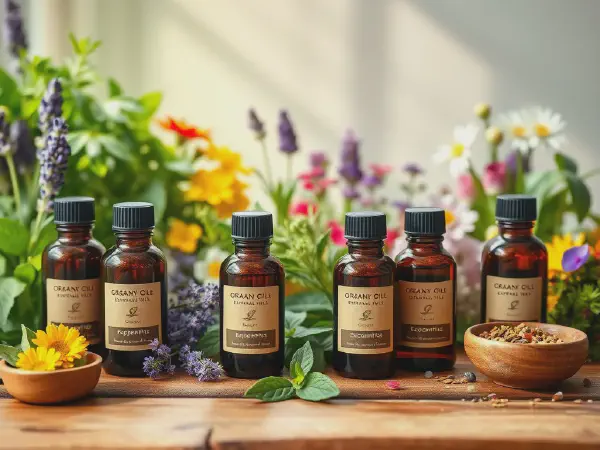Discover Why Organic Essential Oils Are Better for You

Exploring the World of Organic Essential Oils and Their Benefits
Organic essential oils and their benefits have gained immense popularity in recent years as more people seek natural alternatives for health and wellness. These oils are derived from plants, flowers, leaves, and fruits, utilizing methods that are free of synthetic chemicals and pesticides. The growing awareness of the importance of organic products reflects a collective desire to lead healthier lives while minimizing environmental impact.
The benefits of using organic essential oils are manifold, encompassing physical health, mentality, emotional wellbeing, and environmental sustainability. Many individuals have turned to these oils for therapeutic uses, appreciating how they can enhance everyday experiences, from reducing stress and anxiety to boosting immunity and alleviating pain. Organic essential oils serve as a bridge between the ancient wisdom of natural remedies and contemporary holistic health practices.
In this comprehensive article, we will explore the various health benefits of organic essential oils, their positive environmental impact, ways to use them safely and effectively, how to choose high-quality options, and their cultural and historical significance. By delving into these dimensions, we can understand why organic essential oils have become essential staples in many households around the globe.
Looking at the wide range of organic essential oils available, from lavender and tea tree to eucalyptus and peppermint, it’s clear that these plant extracts not only carry delightful scents but also possess powerful therapeutic properties. As we learn more about organic essential oils and their benefits, it’s vital to recognize their multifaceted applications and how they can enrich our lives while fostering a connection with the natural world.
Ultimately, the rise of organic essential oils reflects a growing trend towards conscious consumerism, where individuals seek products that align with their values of health, wellness, and sustainability. Organic essential oils are a testament to the profound benefits of nature's bounty, enhancing our physical and emotional health while respecting the planet.
Many people are turning to Organic essential oils for their therapeutic benefits and natural healing properties.
Health Benefits of Organic Essential Oils
Organic essential oils play a significant role in promoting mental health and wellbeing. Aromatherapy, which involves inhaling the aromatic compounds of these oils, has been shown to reduce symptoms of stress, anxiety, and depression. For instance, essential oils such as lavender and bergamot can create a calming effect, improving mood and promoting relaxation. Furthermore, the use of organic oils in diffusers or baths can enhance the overall sensory experience, leading to better mental clarity and focus.
In addition to mental health, organic essential oils serve as natural remedies for common ailments. Tea tree oil is renowned for its antimicrobial properties, making it a popular choice for treating skin irritations and infections. Similarly, peppermint oil can effectively alleviate headaches and digestive issues. Essential oils like eucalyptus and lemon balm also provide respiratory support, helping individuals manage symptoms of colds and allergies naturally.
The skin benefits of organic essential oils are noteworthy, as these oils often contain compounds that nourish, soothe, and protect the skin. For example, frankincense and rose essential oils can improve skin tone and texture, while jojoba oil acts as a natural moisturizer. Furthermore, many organic oils have anti-inflammatory and antioxidant properties, making them effective for addressing conditions like acne and eczema, thereby promoting healthy skin.
When comparing synthetic oils to organic variations, the differences become apparent, particularly in terms of quality and safety. Organic essential oils are generally free from harmful chemicals, ensuring that they are suitable for both topical and aromatic use. In contrast, synthetic oils might contain additives and non-naturals that can trigger skin sensitivities or allergic reactions. Understanding the importance of organic sourcing is essential for ensuring the purity and efficacy of essential oils.
Environmental Impact of Organic Essential Oils
The sourcing of organic oils typically emphasizes sustainable practices, benefiting both producers and the environment. Many companies involved in the production of organic essential oils prioritize ethical farming, supporting local communities and promoting biodiversity. This method of sourcing ensures that the plants are cultivated in ways that preserve ecosystems and the integrity of the soil.
By reducing the chemical footprint on ecosystems, organic essential oils contribute to healthier environments. The elimination of synthetic fertilizers and pesticides used in conventional farming means that waterways and soil health remain protected. Additionally, the organic farming methods encourage soil health and biodiversity, fostering rich ecosystems that can withstand environmental changes.
Biodiversity is crucial in organic farming practices, which typically involve crop rotation and polyculture. This practice not only enhances the resilience of agricultural systems but also promotes habitats for various species, indispensable for maintaining ecosystem balance. The production of organic essential oils aligns with these practices, supporting a variety of flora and fauna that might be threatened by monoculture farming methods.
Looking towards the future, the long-term environmental advantages of organic essential oils are significant. As consumers increasingly choose organic products, the demand for sustainable practices in agriculture will continue to rise. This trend will encourage more farmers to adopt organic methods, thereby preserving biodiversity and reducing the environmental impact of farming, making organic essential oils beneficial for both health and the planet.
Usage and Application of Organic Essential Oils
When using organic essential oils, safety is paramount. Proper dilution is essential for topical application, especially for individuals with sensitive skin or conditions such as eczema. Essential oils should be mixed with carrier oils like coconut or jojoba oil before being applied to the skin. Additionally, in aromatherapy, oils can be diffused in controlled amounts to avoid overwhelming scents that may result in headaches or respiratory issues.
DIY recipes featuring organic essential oils are an exciting way to explore their benefits. From homemade cleaning solutions using lemon and tea tree oils to soothing bath blends containing lavender and chamomile, the versatility of these oils offers countless possibilities. Creating custom blends not only enhances the aroma of a space but also allows for a tailored approach to health and wellbeing.
Incorporating organic oils into aromatherapy practices can yield countless benefits, such as relaxation, energy boosts, and enhanced concentration. Some popular choices for this practice include peppermint oil for focus and rosemary oil for mental clarity. Many people find that meditation and deep breathing exercises complemented by essential oils can vastly improve their overall experience, elevating their sense of tranquility and presence.
Combining organic essential oils can amplify their effects. For example, blending lavender with chamomile can produce a calming effect, perfect for sleep and relaxation. Those interested in rejuvenation can mix citrus oils with mint for an invigorating and refreshing scent. Experimenting with combinations can lead to enhanced therapeutic effects and improved enjoyment of the oils.
Choosing Quality Organic Essential Oils
Identifying pure organic essential oils is key to maximizing their benefits. One should look for oils that are labeled as “100% pure” and “organic.” Be cautious of oils labeled as “fragrance oils” or “perfume oils” as they often contain synthetic compounds. Additionally, reputable brands will provide information regarding the extraction processes used, ensuring transparency in sourcing and quality.
Understanding certifications and labels can also help in distinguishing high-quality organic essential oils. Certifications like USDA Organic or Food and Drug Administration (FDA) compliance will typically indicate a level of quality assurance in the products. Researching established brands that adhere to these standards can guide consumers in making informed choices.
Proper storage of organic essential oils is crucial for maintaining their potency and longevity. Essential oils should be kept in dark glass bottles, away from sunlight and excessive heat, which can degrade their quality. A cool and dry environment is ideal, ensuring that the oils retain their aromas and therapeutic properties for an extended period of time.
When comparing brands for quality assurance, seeking reviews and customer feedback is beneficial. Trusted brands often carry a reputation built on positive experiences and transparency regarding their ingredients. Additionally, many companies provide batch-specific testing results, ensuring the oils are free from contaminants and deliver consistent quality.
Cultural and Historical Significance of Organic Essential Oils
The traditional uses of essential oils in different cultures are vast and varied. For centuries, organic oils have held a revered place in healing practices, rituals, and traditional medicine across civilizations. From ancient Egypt using oils for embalming and skin care to traditional Chinese medicine incorporating oils for holistic healing, these practices reflect a deep connection between essential oils and cultural heritage.
The evolution of essential oils through history showcases how these precious plant extracts have transformed. What began as ancient wisdom and practices have now merged with modern science, creating a rich tapestry of cultural significance. Essential oils have transitioned from being niche remedies to becoming vital components of wellness in contemporary life.
In modern wellness practices, organic essential oils have found a prominent role in holistic health and wellbeing. Many people now turn to these oils for natural solutions to everyday challenges, embracing the convenience and therapeutic benefits they provide. The rise of holistic health professionals and aromatherapists reflects the growing recognition of essential oils in promoting overall wellness.
Future trends in essential oils suggest exciting developments, particularly as research and market interest continue to grow. The demand for sustainable, organic products will likely drive innovation in the industry, with an increasing focus on ethical sourcing, sustainability, and consumer education. As a result, organic essential oils will reinforce their position as invaluable tools for health, wellness, and environmental stewardship.
